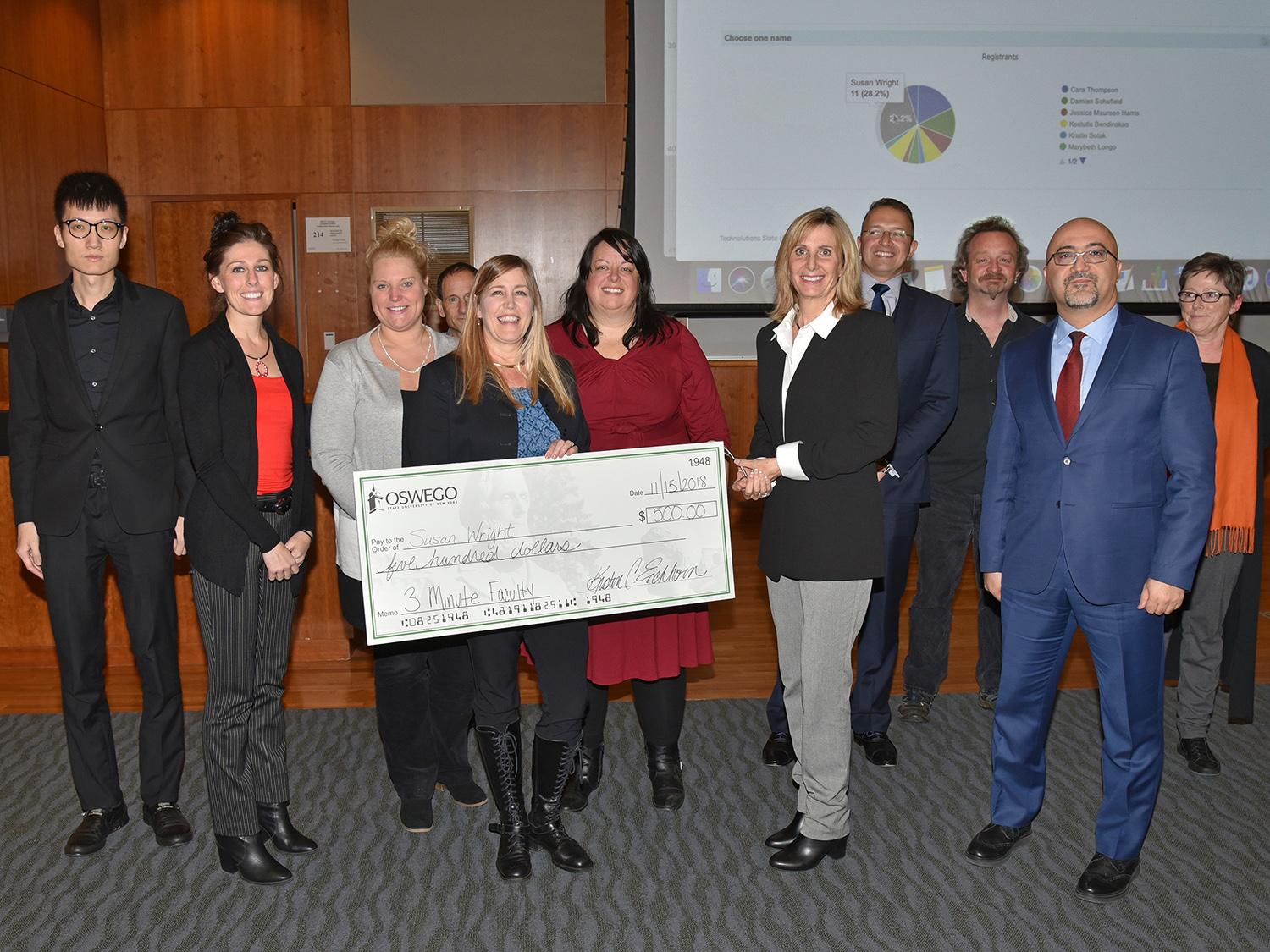'Lightning talks' -- A dozen participants in the SUNY Oswego Division of Graduate Studies' first 3-Minute Faculty competition in research presentations included winner Susan Wright (holding check) and (from left) Yi Liu of accounting, finance and law; Kristin Sotak of management and marketing; Jessica Maureen Harris of health promotion and wellness; Steven Abraham (partially hidden) of management and marketing; Michele Thornton of management and marketing; Marybeth Longo of communication studies; Stathis Kefallonitis of management and marketing; Damian Schofield of human-computer interaction; operations management instructor Yavuz Keceli, the seventh of the School of Business competitors; and Cara Thompson of art.
The strengths of faculty research in SUNY Oswego's School of Business was a highlight of the 3-Minute Faculty competition during Graduate Studies Week at the college in November.
The event pointed to faculty scholarship as crucial to top-notch teaching, with competitors having three minutes to present in a manner open to a general audience.
Seven of the competition's 12 participants were business faculty members. The audience-anointed winner was Susan Wright of the school's accounting, finance and law faculty with a presentation on "Blending 'Old-Tech' with 'New Tech' to Document Online Learning."
Irene Scruton, assistant dean and director of master of business administration programs in the School of Business, praised the faculty for stepping up to the challenge in the college's first-ever 3-Minute Faculty event, modeled after the 3-Minute Thesis competition pioneered by the University of Queensland, Australia.
"Many people may have the perspective that professors in the business school are practitioners," Scruton said. "They don't necessarily think about the faculty as researchers with international reputations for their scholarly work. Many of our faculty are ahead of the curve in terms of what issues will be impacting business organizations in the future."
Wright sounded a similar theme. "A large number of (business) faculty have very interesting research endeavors," she said after receiving an outsized winner's check representing $500 for research or conference travel. "Their work ranges from the very complex to something very relatable and practical. We also explore what's new in teaching and learning. We cover all of it."
Constant renewal
A School of Business listing of the last five years' worth of faculty members' intellectual contributions -- books, book chapters, peer-reviewed journal articles, conference proceedings and others -- spans the work of those teaching courses in all MBA graduate programs, as well as in all of the school's undergraduate majors: business administration, marketing, management science, risk management and insurance, human resource management, public accounting, finance and cross-discipline majors such as operations management and information systems.
"Research certainly keeps faculty members current in their field," said Richard Skolnik, dean of the School of Business. "By engaging in research, they are constantly renewing their intellectual capital, and they can bring that into the classroom. They are modeling the value of research for their students."
Wright's School of Business colleagues in the competition were Steven Abraham, who this semester teaches human resource management and employment law; Yavuz Keceli, operations management and management information systems; Stathis Kefallonitis, marketing management and brand experience marketing; Yi Liu, accounting principles; Kristin Sotak, organizational behavior and business organization; and Michele Thornton, healthcare leadership, economics of healthcare, and life and health insurance.
Their research projects ranged from using biometrics such as facial recognition and eye tracking to study airline passengers' reactions to meals and other amenities (Kefallonitis) to research on leveraging 10 years of patient data to inform the marketing of medical tourism in New York City (Thornton).
Skolnik pointed out that accreditors from the American Association for Collegiate Schools of Business -- SUNY Oswego's School of Business earned AACSB accreditation renewal last year -- put a strong emphasis on research, dividing scholarship into three sectors: theory, application and pedagogy.
"Research also contributes to the knowledge base in business disciplines and related fields," he said.
Encouraging scholarship
Engaging students in research also is vital, Skolnik said. He pointed to a unique, cross-cultural student research conference the school annually organizes in partnership with Shanghai Normal University in China. Students from Oswego and SNU often collaborate on faculty-mentored projects to present at an annual conference, which alternates each year between Oswego and Shanghai. The dean said students have reported "transformational" experiences working with each other on scholarly projects and presentations.
The college's annual Quest symposium in April draws faculty and student research presentations from across campus, including work originating in the business school.
The School of Business also hosts visiting international scholars -- 46 in the last 12 years -- producing cross-cultural collaborations among researchers here and those, primarily, from China but also Egypt, Pakistan, Turkey and France. This spring, SUNY Oswego also hosted the annual conference of the Business Research Consortium of Western New York, which promotes academic scholarship related to business and economics.
Scruton emphasized that the importance of scholarship goes hand-in-hand with making sure SUNY Oswego business students have rich experiences in the field: internships, cooperative education, competitions such as Launch It for entrepreneurial business plans, student clubs such as Enactus engaged in community-centric business projects, presentations by alumni working in a wide variety of professions, and more.




